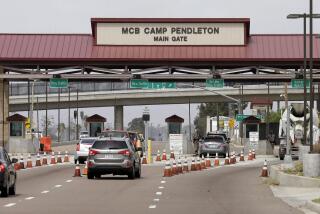Study finds boredom puts troops at risk of anti-social behavior later
- Share via
It’s long been assumed — correctly — that a Marine who experiences the psychological trauma of combat in Iraq or Afghanistan has an increased chance of getting into trouble when he comes home.
But two researchers at the Naval Health Research Center in San Diego have found another deployment experience that can be an even greater precursor of bad behavior later: boredom.
A survey of 1,543 Marines at Camp Pendleton, Twentynine Palms, Calif., and the Marine base in Okinawa, Japan, found that the Marine most likely to disobey orders, get into physical confrontations, neglect his family or run afoul of the police is one who reports that his war zone deployment was marked by boredom.
Dr. Stephanie Booth-Kewley and Robyn Highfill-McRoy of the research center’s behavioral sciences and epidemiology department reported on their study to the Navy and Marine Corps Combat & Operational Stress Conference this week in San Diego. Their findings may later be published in the journal Aggressive Behavior.
Of the Marines surveyed, the researchers said, fully one-quarter had had repeated instances of misconduct/misbehavior in the months after returning from deployment; 17.1% screened positive for possible post-traumatic stress disorder.
For both PTSD and misbehavior, what the researchers called “deployment-related stressors” were a greater factor than combat.
Marines who said their deployment was marked by boredom, monotony, lack of privacy and lack of days off are three times more likely to engage in anti-social behavior than those with different experiences, the researchers found. Other stressors include family worries, money problems and run-ins with deployed leadership.
The study also concluded that divorced Marines, younger Marines and those with mild traumatic brain injury are also more likely to display such behavior when they return. The average age of the Marines in the survey was 26 years; 46% had been deployed multiple times.
Military boredom has been studied since World War II by a variety of researchers. A common conclusion is that boredom leads to alienation, followed by resentment and anger.
The findings of the current study take on added significance given the “non-kinetic” nature of much of the Marines’ counterinsurgency mission in Afghanistan.
Few troops will see active combat. But nearly all will be assigned tasks — standing post, providing security for convoys, repairing vehicles or other equipment, manning communication gear, handling administrative chores — that are important, but lack the excitement that attracts young men and women to enlist in the Marine Corps.
The challenge, the researchers said, is for commanders to maintain troop morale by emphasizing the importance of the mission.
Navy Capt. Paul Hammer, director of the Naval Center for Combat & Operational Stress Control at Naval Medical Center San Diego, said the findings are not altogether surprising.
“What’s the best way to stop being bored?” he asked, rhetorically. “Get into some trouble.”





